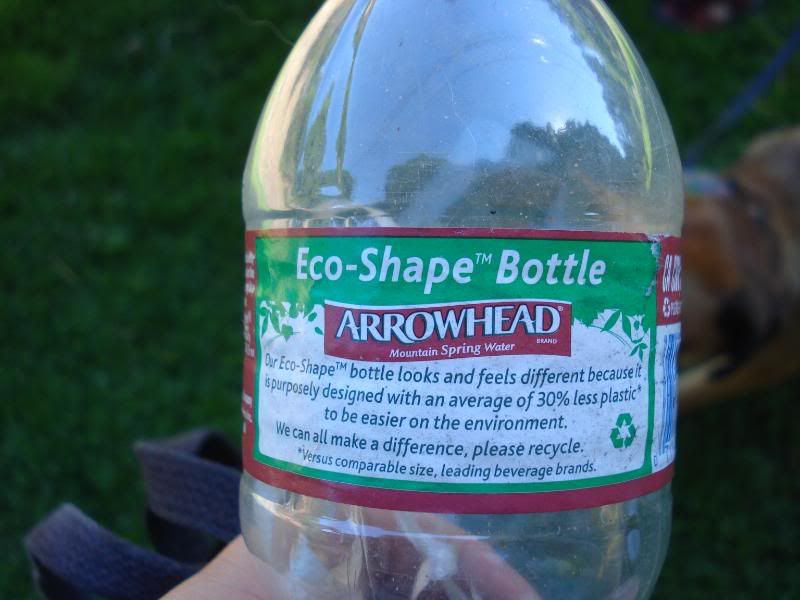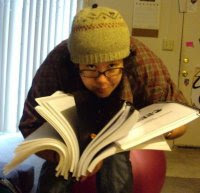Today we went to Avery Park for a walk around the loop trail and down to the edge of Mary's River. Freyja and Moose had a splendid time swimming around. Especially Freyja who thinks she is part river otter.
In the course of our walk we saw many delightful things. The rose gardens still had plenty of flowers blooming, and the native plant garden--although well past blossoming-- was fantastic and inspiring. As I walked I thought about this blog and what I might say regarding sustainability. The Avery Park composting display seemed promising, and the apparent health of the River did too, but then this appeared...

beneath the shrubs between the native plants and the playground. Although by this point in the walk I had already picked up a dozen cigarette butts, a burger king wrapper, a kiddie drink cup, two pull tabs, and a heap of fishing line, I found this particular object worthy of a photograph. In fact upon inspection I found it worthy of two photographs.

This label states that this particular bottle is designed to contain 30% less plastic than the "typical" bottle. While I think this is admirable in someways it is also misleading. Minor efforts like this seem to lull the consumer into thinking that such a purchase is "ecofriendly"-- a positive act.
Plastics in general are toxic. While they are used medically to save lives as the plastics industry has reminded us in their advertisements, they are not really safe for eating and drinking. They are especially unsafe for children.
It was only about a year ago when I discovered that many plastics contain toxic chemicals that leech into the foods and beverages stored in them. The main toxin that I have read about are phthalates. Granted this is only one toxin group but it is enough for me to be very wary.
Despite the fact that the Phthalate Information Center (a group with panel members from BASF Corporation, Eastman Chemical Company, and ExxonMobile) claim that "Phthalates have established a very strong safety profile over the 50 years in which they have been in general use". I tend to put some stock in the numerous university studies that show a correlation between phtalates and endocrine anomalies, reproductive harm, and carcinogenic effects.
Beyond the toxicity, another issue is the waste of resources involved in the production of plastic bottles. Although plastic is recyclable it can only be recycled so many times before it is no longer usable. Much of what plastic is recycled does not re-enter the consumer market. Most if not all of the plastic bottles consumers purchase are of virgin plastic. Plastic is a petroleum product that is energetically costly to produce.
Bottled water is especially troubling since it is mostly a "luxury" purchase.
Americans shell out more than $20,000 "every minute of every day" or up to 60 cents for a glass of bottled water
1978 Consumption = 415 Million Gallons**
2006 Consumption = 8.2 Billion Gallons***
For comparison, Worldwide Consumption =
41 Billion Gallons***
It takes 1,851 gallons of water to refine one barrel of crude oil.**
Twenty-four gallons of water are needed to make one pound of plastic. **
1.5 to 2.7 million tons of plastic used per year to make bottles for bottled water.***
That’s 24gal/pd X 2000 pd/ton x 1.5 million tons = 72 billion gallons of water or 24 times the quantity of water used by the City of Corvallis every year to make bottles that are empty.
**Emily Gersema, Associated Press (2003)
***FAO and Earth Policy Institute (2006)
Disturbing. At least to me and to Bird. Although it is seemingly impossible to avoid plastics altogether, it is easy to substantially reduce how much plastic one uses. We've stopped all plastic shopping bag use by bringing our own bags. We've started saving bread bags and produce bags to reuse them. We're slowly but surely converting to bell jars for all of our storage needs, and are in the process of phasing plastic utensils out of our kitchen with the help of our local Goodwill's utensil bin. It's an uphill battle, but a fantastic adventure.




5 comments:
Freyja is a river otter. Glad I took that Geo class, so we could have some information to disseminate.
Thank u much for the tips on plastic reduction! Kinda creepy to think how much water goes into the oil process! Makes me never want to drive again
julie, you need to get into law
I agree! You should get into law!
love A
Yes I would agree with the anonymous comments. I knew it wasn't good. But that is really disturbing to think about. Thanks for the info! I will definitely be thinking about what I just read from now on!
Post a Comment